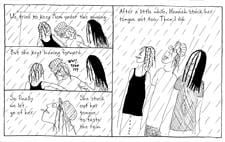What really sets Sarah Leavitt’s debut graphic memoir apart is its honesty, its courage to be raw and revealing.
Where Alison Bechdel’s recent graphic memoir left me dry-eyed, Leavitt’s lack of self-consciousness, her willingness to tell the very personal story of her mom’s deterioration from Alzheimer’s, moved me to tears.
“It’s really hard for people to just write down what happened,” Leavitt tells me over lunch. “People have this concept of writing: like it’s good writing if it has metaphors.”
People also hide behind their carefully detached analysis to keep the pain at bay, I suggest.
Leavitt, a former Xtra Vancouver columnist, nods, recalling some advice from a fellow writer: “Stop with the theorizing and the fancy words and just tell your story!”
It’s not the easiest story to tell, but in Tangles: A story about Alzheimer’s, my mother and me, Leavitt shares her experience of her mother’s illness with tenderness and candid pain.
“This was something so big and so sad that was happening to me,” she says. It was beyond forgetting; Leavitt’s mother lost her “ability to navigate the world, to move through space.”
“She didn’t just stop recognizing me,” Leavitt explains. “She lost her sense of what a daughter is.”
Initially, Leavitt began documenting her mother’s deterioration so she wouldn’t forget it. “But then it was important to share it, kind of like a witness: this is the horrible thing that happened to me and I was there and I’m reporting back.”
On one page, she reports back on her mother’s unwillingness to discuss any possibility of a problem, even as she loses track of how to exit a cab, follow directions or unclasp her hands.
Several pages later, the scene shifts to a neurologist’s office, where a diagnosis is finally made. And then the slow unravelling begins, the gradual loss of understanding, of motor skills, of words, of self.
“The hardest part,” Leavitt says, “might have been watching her when she was aware of being sick. And imagining what it was like to have Alzheimer’s and know that you have Alzheimer’s.”
Throughout, Leavitt tells her story as a daughter, and as a queer daughter.
“It’s part of writing about the full picture of what it means to be queer,” she says.
Being queer affects the ways in which we move through the world and interact with our families, she explains. Some experiences are shared; others happen because we’re queer, or take on different meaning based on our particular ways of thinking about things.
Leavitt says she was very conscious, for example, of how isolated her parents became as her mom got sick. “I would often contrast their experience with my own” experience of community and chosen family, she says.
Then there was the time two teenaged boys yelled “dykes” at Leavitt and her mom as they walked home hand in hand.
Leavitt lost it.
It was such an emotional time, she acknowledges, adding that she had always worried about being called a dyke while holding hands with her mom in Fredericton.
Leavitt pushed her mother into the house then chased the boys, yelling.
“I was going to explain to them that I was a dyke, yes, but that she was my mom, and they should show some respect,” she writes in Tangles. “But I couldn’t catch up to them.”
As her mother’s illness advanced, her need for assistance with bathing and other bathroom functions intensified. “It’s uncomfortable for anybody to do that kind of thing for their parent,” Leavitt says, adding that she was extra aware in those moments of being queer. “It’s that assumption that it’s more neutral for a woman to do intimate care for a woman.”
Asked if Tangles is a queer book, Leavitt hesitates. “I don’t know. I mean, it’s not about lesbians and Alzheimer’s. But it is.”
Sarah Leavitt’s debut graphic novel Tangles has been shortlisted for the Writers’ Trust Non-Fiction Prize, which recognizes the year’s best work of non-fiction by a Canadian writer. The winner will be announced on Nov 2.

 Why you can trust Xtra
Why you can trust Xtra


